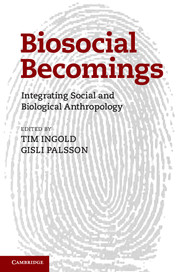Book contents
- Frontmatter
- Contents
- Preface
- 1 Prospect
- 2 Ensembles of biosocial relations
- 3 Blurring the biological and social in human becomings
- 4 Life-in-the-making: epigenesis, biocultural environments and human becomings
- 5 Thalassaemic lives as stories of becoming: mediated biologies and genetic (un)certainties
- 6 Shedding our selves: perspectivism, the bounded subject and the nature–culture divide
- 7 Reflections on a collective brain at work: one week in the working life of an NGO team in urban Morocco
- 8 The habits of water: marginality and the sacralization of non-humans in North-Eastern Ghana
- 9 ‘Bringing wood to life’: lines, flows and materials in a Swazi sawmill
- 10 Humanity and life as the perpetual maintenance of specific efforts: a reappraisal of animism
- 11 Ravelling/unravelling: being-in-the-world and falling-out-of-the-world
- 12 Retrospect
- References
- Notes on the contributors
- Index
Preface
Published online by Cambridge University Press: 05 June 2014
- Frontmatter
- Contents
- Preface
- 1 Prospect
- 2 Ensembles of biosocial relations
- 3 Blurring the biological and social in human becomings
- 4 Life-in-the-making: epigenesis, biocultural environments and human becomings
- 5 Thalassaemic lives as stories of becoming: mediated biologies and genetic (un)certainties
- 6 Shedding our selves: perspectivism, the bounded subject and the nature–culture divide
- 7 Reflections on a collective brain at work: one week in the working life of an NGO team in urban Morocco
- 8 The habits of water: marginality and the sacralization of non-humans in North-Eastern Ghana
- 9 ‘Bringing wood to life’: lines, flows and materials in a Swazi sawmill
- 10 Humanity and life as the perpetual maintenance of specific efforts: a reappraisal of animism
- 11 Ravelling/unravelling: being-in-the-world and falling-out-of-the-world
- 12 Retrospect
- References
- Notes on the contributors
- Index
Summary
The articles in this book were developed in response to an invited panel (Human Becomings: Beyond the ‘Biological’ and the ‘Social’) which we organized at the biennial meeting of the European Association of Social Anthropologists (EASA) in Maynooth, Ireland, in August 2010. When reading submitted panel abstracts for the biennial meeting and planning the event a few months before it actually took place, the EASA organizers had been struck by the absence of any proposal to seriously engage with the ‘biological’ and its implications for the discipline of anthropology. This seemed rather strange in the light of repeated critiques in recent years of the nature/society dualism, of the increasing frustration with received theoretical paradigms, and of growing demands for some form of integration of the social and the biological in a variety of fields and disciplines both in the humanities and social sciences (social and cultural anthropology, sociology, psychology, philosophy) and in the life sciences (biological anthropology, human genetics, evolutionary and developmental biology, environmental science). The need for integration seemed all the more pressing in the context of the study of humans, traditionally divided between the two radically separated subfields of biological-physical and social-cultural anthropology.
As a result, we were invited to organize a panel to address the theoretical dualism of nature and society and to explore possible new directions for anthropology and related disciplines. Our panel summary generated extensive interest and we received far more abstracts than we could cope with, given the time constraints of the conference. The panel itself was very well attended and generated keen interest and discussions which continue in the form of a new network that has been set up under the umbrella of the EASA: http://www.easaonline.org/networks/biosoc/index.shtml.
- Type
- Chapter
- Information
- Biosocial BecomingsIntegrating Social and Biological Anthropology, pp. vii - viiiPublisher: Cambridge University PressPrint publication year: 2013



